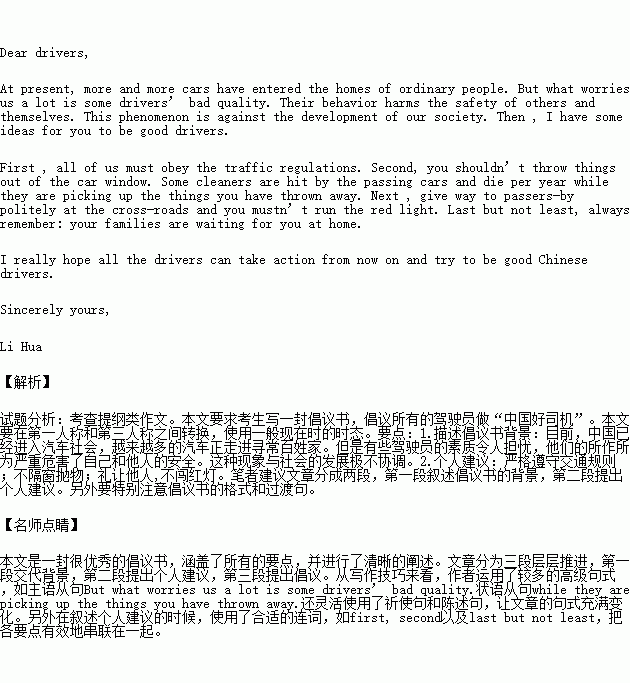题目内容
书面表达
目前,中国已经进入汽车社会,越来越多的汽车正走进寻常百姓家。但是有些驾驶员的素质令人担忧,他们的所作所为严重危害了自己和他人的安全。这种现象与社会的发展极不协调。请你以李华的身份,结合下列几点写一封倡议书,倡议所有驾驶员做“中国好司机”。
主要内容包括:
1. 简单描述以上现象;
2. 你的建议:
1)严格遵守交通规则;
2) 不隔窗抛物;
3) 礼让他人,不闯红灯。
注意:1. 词数100左右
2. 可以适当增加细节,以使行文连贯;
3. 开头和结尾已给出,不计入总词数。
参考词汇:规则 regulations 让路give way to ; 闯红灯run the red light
Dear drivers,
At present, more and more cars have entered the homes of ordinary people.
Sincerely yours,
Li Hua
 阅读快车系列答案
阅读快车系列答案书面表达
假定你是李华,最近参加了由某电视台举办的中学生英语演讲比赛并获奖,该台准备组织获奖者去北京参加一次英语暑期夏令营活动,现就有关事项征求你的意见。请根据下表所提供的信息用英语以书信形式给予答复。请在答题卡上作答。
活动时间 | 7月16日~22日或8月18日~24日 |
活动内容 | 参加英语角 学唱英语歌曲 听英语讲座 表演英语短剧 看英语电影 教外宾学中文 |
对活动内容的 建议或要求 |
注意事项:
1. 选择适合你的时间,并说明理由;
2. 选择两项你喜欢的活动,并说明理由;
3. 对活动内容提出至少一个建议或要求;
4. 词数:100左右;
5. 信的开头和结尾已给出。
Dear Sir or Madame,
I’m very glad to be invited to the English summer camp.
______________________________________________________________________________________
______________________________________________________________________________________
______________________________________________________________________________________
Thank you very much,
Yours truly,
Li Hua

